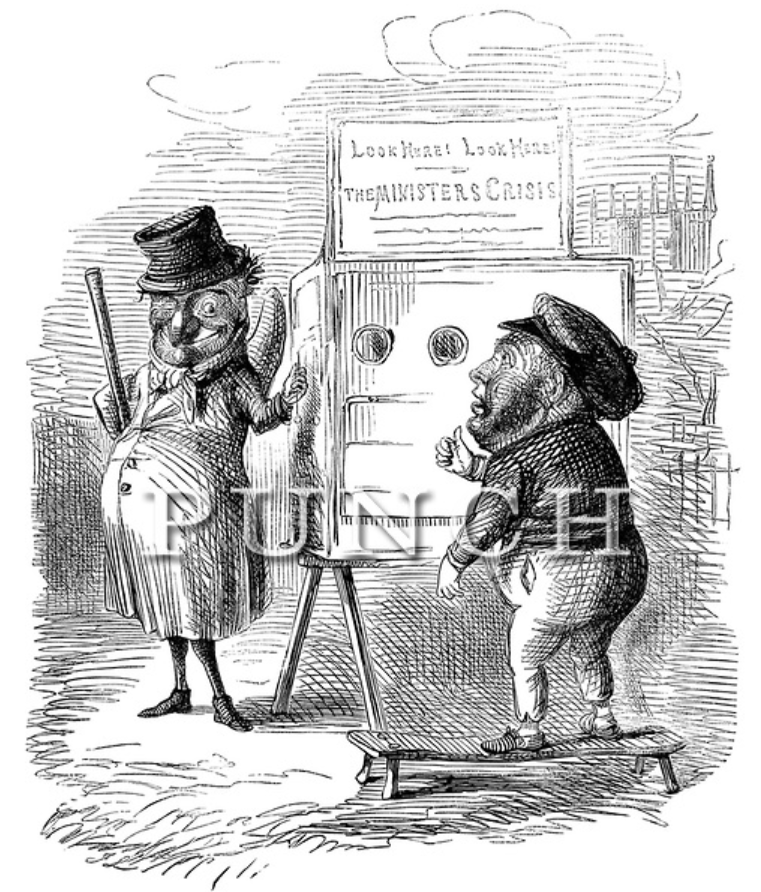 Editor’s note: In a February 1988 New York Times column, William Safire traces this expression to a cartoon in an 1846 edition of Punch magazine. The cartoon, entitled “The Ministerial Crisis,” features a showman telling a customer, “Which ever you please, my little dear. You pays your money, and you takes your choice.” Safire provided context from Edward C. Stephens, who at the time was dean of Syracuse University’s Newhouse School of Public Communications: “The phrase is used today not so much as an invitation to choice as it is a rejoinder to complaint. It seems to be similar in intent to, ‘You made your bed, now lie in it.’ ”
Editor’s note: In a February 1988 New York Times column, William Safire traces this expression to a cartoon in an 1846 edition of Punch magazine. The cartoon, entitled “The Ministerial Crisis,” features a showman telling a customer, “Which ever you please, my little dear. You pays your money, and you takes your choice.” Safire provided context from Edward C. Stephens, who at the time was dean of Syracuse University’s Newhouse School of Public Communications: “The phrase is used today not so much as an invitation to choice as it is a rejoinder to complaint. It seems to be similar in intent to, ‘You made your bed, now lie in it.’ ”
Once upon a time, my late beloved, wife, Marylyn, and I decided to count the semesters that our five kids had spent in “public” and private schools beginning in Illinois in 1963 and continuing from 1968 in Berkeley, Calif.
Why would such a proportion have mattered to us? I suspect that Marylyn’s years as a public schoolteacher plus her strong sense of parental and civic responsibility had, for that moment, made yesterday’s decisions seem a matter for self-examination. I’m not clear that our answer (precisely, a 50-50 split between public and private schools) was directly relevant to the ongoing quarrels over “school choice,” but it can serve as a specimen of the control so cherished by parents like ourselves of middle or higher incomes, over where their child shall spend his or her 2,340 days experiencing the formal schooling required of all kids.
We were buyers in that market of schools, all of which were competing for our business; and those labeled “public” were every bit as dependent upon our personal decisions as were Montessori or St. Ann’s. That’s the way it was, and to this day remains, at least in the sort of neighborhoods we preferred and could afford to inhabit.
From the start of School Year 1968 (our first in Berkeley) we elected to send all the kids to the newly racially integrated “public” schools. We were enthusiastic customers, as were most of our neighbors. This was expected to be an experience we wanted for our children, even though, at least for our two older boys, it would mean getting bused to a school well outside our neighborhood.
Over time, this system has, to a degree, served the purpose of integration, at least at John Muir, the K-5 elementary just up the street. Our three younger children remember it in mostly positive terms. Sadly, the older boys who were bused to Malcolm X (originally Lincoln) found a strange atmosphere of hostility and blame from some of the faculty.
After two years, we switched our children to a racially integrated Catholic school, which then served all five children until each moved on to high school. The boys all spent grades 9 through 12 with the Christian Brothers. For one year, our youngest tried a co-ed Catholic high school which disappointed; then to her – and our – satisfaction, she shifted to Berkeley High.
Thus, we made our choices, some perhaps to be regretted, but I think we learned from our mistakes. The responsibility for decision-making was good for all of us.
What is the point of this ramble? Simply that parents like ourselves have not merely the abstract legal authority to choose the school but the means to do so, either by moving to the neighborhood of our preferred public school or paying private school tuition, as we did for one-half of our children’s school years.
But the children of the poor also have to be schooled; in truth, their need is often greater. And their parents’ authority to choose could be realized, just as our own, without increasing the total cost to the taxpayer – if that be an object of reform. The dignity of the poor could be realized as was ours; their domestic roles could be validated and celebrated. And our government schools could, at last, deserve the title “public.”
The loser, obviously, would be the officers of the teacher unions for whose welfare the poor have been kept in bondage. I can’t shake the memory of my friend Albert Shanker, president of both the United Federation of Teachers and the American Federation of Teachers, and his oft-repeated slogan: “I’ll represent children when they start paying union dues.”
Of course, each child does exactly that when forced by family poverty into a school the parent loathes.


